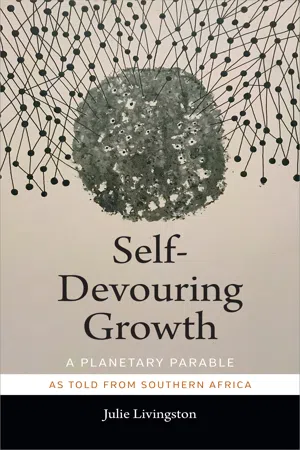
- English
- PDF
- Available on iOS & Android
eBook - PDF
About this book
Under capitalism, economic growth is seen as the key to collective well-being. In Self-Devouring Growth Julie Livingston upends this notion, showing that while consumption-driven growth may seem to benefit a particular locale, it produces a number of unacknowledged, negative consequences that ripple throughout the wider world. Structuring the book as a parable in which the example of Botswana has lessons for the rest of the globe, Livingston shows how fundamental needs for water, food, and transportation become harnessed to what she calls self-devouring growth: an unchecked and unsustainable global pursuit of economic growth that threatens catastrophic environmental destruction. As Livingston notes, improved technology alone cannot stave off such destruction; what is required is a greater accounting of the web of relationships between humans, nonhuman beings, plants, and minerals that growth entails. Livingston contends that by failing to understand these relationships and the consequences of self-devouring growth, we may be unknowingly consuming our future.
Frequently asked questions
Yes, you can cancel anytime from the Subscription tab in your account settings on the Perlego website. Your subscription will stay active until the end of your current billing period. Learn how to cancel your subscription.
No, books cannot be downloaded as external files, such as PDFs, for use outside of Perlego. However, you can download books within the Perlego app for offline reading on mobile or tablet. Learn more here.
Perlego offers two plans: Essential and Complete
- Essential is ideal for learners and professionals who enjoy exploring a wide range of subjects. Access the Essential Library with 800,000+ trusted titles and best-sellers across business, personal growth, and the humanities. Includes unlimited reading time and Standard Read Aloud voice.
- Complete: Perfect for advanced learners and researchers needing full, unrestricted access. Unlock 1.4M+ books across hundreds of subjects, including academic and specialized titles. The Complete Plan also includes advanced features like Premium Read Aloud and Research Assistant.
We are an online textbook subscription service, where you can get access to an entire online library for less than the price of a single book per month. With over 1 million books across 1000+ topics, we’ve got you covered! Learn more here.
Look out for the read-aloud symbol on your next book to see if you can listen to it. The read-aloud tool reads text aloud for you, highlighting the text as it is being read. You can pause it, speed it up and slow it down. Learn more here.
Yes! You can use the Perlego app on both iOS or Android devices to read anytime, anywhere — even offline. Perfect for commutes or when you’re on the go.
Please note we cannot support devices running on iOS 13 and Android 7 or earlier. Learn more about using the app.
Please note we cannot support devices running on iOS 13 and Android 7 or earlier. Learn more about using the app.
Yes, you can access Self-Devouring Growth by Julie Livingston in PDF and/or ePUB format, as well as other popular books in History & African History. We have over one million books available in our catalogue for you to explore.
Information
Publisher
Duke University Press BooksYear
2019Print ISBN
9781478006398, 9781478005087eBook ISBN
9781478007005
34
CHAPTER
ONE
a
private
property
model
that
privileges
human
beings
as
indi-
viduals
only
by
way
of
their
claims
to
citizenship/membership
in
a
political
entity
and
cleaves
them
off
from
other
species.
e
animated
ecology
is
not
a
nature
out
there
upon
which
humans
act
or
from
which
humans
extract.
It
is
a
living
mani-
festation
of
a
tangle
of
historical
relationships
between
enti-
ties
large
and
small,
humans
past
and
present.
In
an
animated
ecology,
I
would
suest,
limits
on
growth
are
always
present
in
some
form.
But
in
a
developmental
state
where
nature—now
separated
from
humans—becomes
an
object
with
limits
to
be
overcome,
domesticated,
quantified
through
technology,
end-
less
growth
is
the
very
point.
e
developmentalist
state
is
not
the
only
political
formation
with
this
relationship
to
growth.
It
seems
foundational
to
liberalism,
hence
Malthus;
to
em-
pire,
hence
the
Soviet
cotton
schemes;
and
of
course
to
capital-
ism.
Within
this
telos
of
growth,
what
kind
of
bios
is
possible?
What
sort
of
technopolitics
can
we
imagine
will
lead
to
what
sort
of
happiness?
What
political
form
can
again
take
hold
of
the
clouds,
the
rain,
the
sun?
Table of contents
- Cover
- Contents
- Acknowledgments
- Prologue: A Planetary Parable
- 1. Rainmaking and Other Forgotten Things
- 2. In the Time of Beef
- Cattle to Beef: A Photo Essay of Abstraction
- 3. Roads, Sand, and the Motorized Cow
- 4. Power and Possibility, or Did You Know Aesop Was Once a Slave
- Notes
- Index